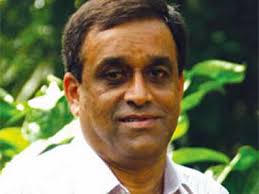
Panaji, July 9 (IANS) US-based Goan NRI Savio Almeida Wednesday questioned the move to book him for sharing on Facebook a morphed photo of Goa PWD Minister Sudin Dhavalikar wearing a pink swimsuit.
Speaking to IANS from Texas, the US, Almeida said he had in the recent past uploaded a video of a ruling MLA and protestors burning an effigy of Dhavalikar in Goa to mark their opposition to the latter’s comments on mini-skirts and bikinis.
“He (Dhavalikar) got more angry when I posted a video of Caitu (Benaulim MLA Caitu Silva) burning his effigy in Navelim,” Almeida said, adding that the FIR may have been spurred by that post made a week back.
Almeida, who claims to have formerly worked for a luxury cruiseliner company before starting a business in the US, further said that it is unusual to find oneself booked in a First Information Report (FIR) in Goa, especially when “hundreds of pics of Luis Suarez biting which were morphed were on Facebook and Google and even showed on news in the USA”.
Almeida now wants the PWD minister to mend Goa’s roads and drainage, instead of lashing out against Facebook users.
The FIR, accusing him and other Facebook users of uploading and circulating the morphed photo, was registered on a complaint by Pradeep Bakhale.
The FIR was Tuesday transferred to the Goa Police Cyber Cell.
Dhavalikar had attracted controversy when he recently said: “Young girls wearing short skirts in nightclubs are a threat to Goan culture. This habit of young girls wearing short dresses everywhere does not fit the Goan culture. We should not allow this. It should be stopped.”
He also advised that women should stop drinking “because it is not good for their health”.
The comments had attracted criticism with the Congress symbolically gifting Dhavalikar a short pink skirt in response.
A couple of months back, an FIR against shipbuilding professional Devu Chodankar for accusing on Facebook then BJP’s prime ministerial candidate Narendra Modi of planning a holocaust had led to prompt police action.
The police action also earned criticism from civil society as well as the opposition which accused the police and state administration of muzzling the internet.




